Health experts say that drinking water in this way is even better than taking supplements or expensive ginseng, according to Boldsky.
How to Drink Water Correctly
- Right After Waking Up
- Before Sleeping
- Before Taking a Shower
- Before and After Eating
- Before and After Exercising
- When Sick
- When Tired
- Before or While Snacking
- Sit While Drinking Water
- Take Small Sips
- Minerals Are the Soul of Water
- Over-purifying Water Has Hidden Dangers
- Scientifically Hydrating Is Truly Beneficial for Health
- Common Mistakes in Drinking Water
- When Does Water Toxicity Occur?
You’ve probably heard countless times that drinking plenty of water is good for your health. When you were younger, your parents and grandparents likely insisted that you drink more water. However, do you know the best times to drink and how much water to consume to fully reap its benefits?
Everyone knows that water is good for health, but there is often confusion about the quantity and timing of drinking. Some people say you should drink 8 glasses, while others insist on at least 2 liters a day. Meanwhile, some recommend drinking more water before noon and less in the afternoon.
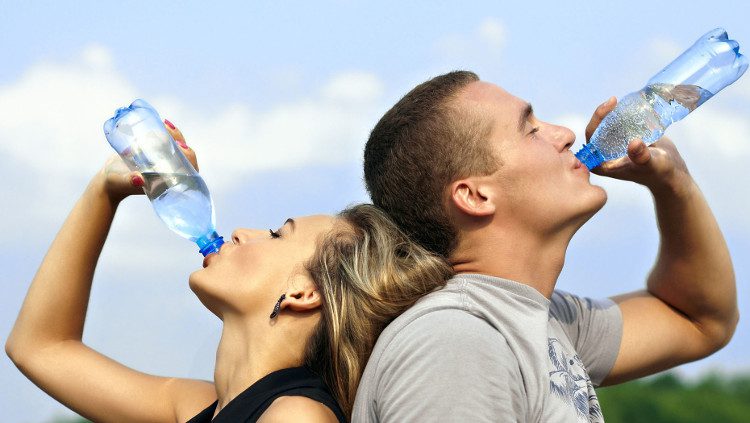
Everyone knows that water is good for health, but there is often confusion about the quantity and timing of drinking.
This conflicting information leaves many people puzzled. In this article, we will show you the most effective way to drink water to maximize its benefits. This guidance comes from some of the world’s top medical professionals, so feel free to apply it.
Right After Waking Up
As soon as you wake up in the morning, drink at least 1-2 glasses of water. This will help stimulate your internal organs and assist in detoxifying your body, giving you a great start to the day.
Before Sleeping
Drinking a glass of water before bed helps prevent dehydration, thereby reducing the risk of stroke and heart attack. Make this a daily habit as you prepare for sleep.
Before Taking a Shower
A glass of water before showering helps regulate blood pressure and reduces the risk of stroke. So, don’t forget to do this from now on.
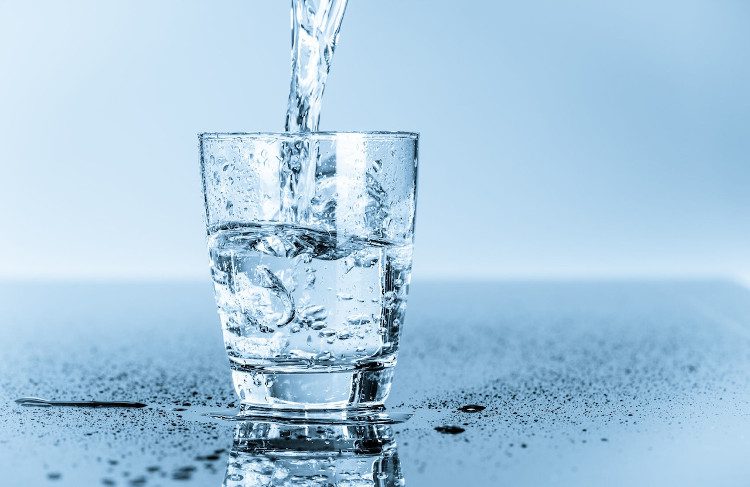
Drinking water before eating helps the body absorb nutrients from food more easily.
Before and After Eating
You should not drink water immediately before or during meals. However, drink a glass half an hour beforehand. Not only does this aid in digestion, but it also helps curb appetite. Those who are losing weight should adopt this practice.
Additionally, drinking water at this time helps your body absorb nutrients from food more effectively.
Before and After Exercising
Drink 1-2 glasses of water before exercising. This will ensure your body is hydrated to support strenuous activity. After exercising, make sure to drink a glass to replenish lost fluids and prevent dehydration.
When Sick
Drinking plenty of water when you’re sick is crucial. It helps keep your body hydrated and prevents dehydration. This, in turn, keeps bacteria and viruses at bay.
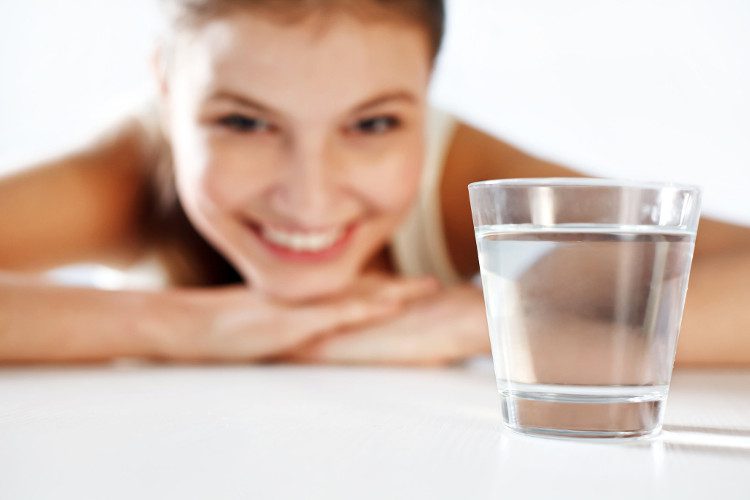
Drinking a glass of water provides immediate energy to the body.
When Tired
If you often feel fatigued, it may be a sign that your body isn’t getting enough water. Drinking a glass of water can provide an instant energy boost.
Before or While Snacking
Having a glass of water before or while snacking can help curb cravings. This, in turn, limits calorie intake, helping prevent weight gain.
Sit While Drinking Water
You should sit down to drink water instead of standing. Drinking water while standing can disrupt the body’s fluid balance, potentially leading to excess water accumulation in the joints, causing arthritis.
Conversely, when you sit to drink water, your muscles and nervous system are much more relaxed, allowing digestive nerves to work more efficiently. Your kidneys also enhance their filtration process when seated.
Take Small Sips
Drinking water in small sips rather than large gulps is one of the correct ways to hydrate. You should sip, swallow, breathe, and repeat this process while drinking to ensure the water is absorbed fully through cell membranes.
Minerals Are the Soul of Water
People are often advised to “drink plenty of water”, but what type of water is beneficial for the human body? According to a survey on water awareness and quality of life, 65.9% of people only drink water when thirsty, 17.5% only consume beverages like sodas or packaged drinks, and 11.6% drink water based on preference.
Science identifies that various chemical elements essential in human blood must be sourced from water, particularly minerals.
From a nutritional standpoint, the role and importance of minerals are on par with vitamins. Deficiency in minerals can lead to various health conditions. Natural mineral water is rich in the trace elements and minerals necessary for human health, dissolved in the Earth’s crust.
Regular consumption of mineral water can help compensate for calcium deficiencies. Additionally, mineral water contains beneficial elements like silicon, strontium, and metasilicic acid. Silicon is a component of human bones, while metasilicic acid softens blood vessels.
Consuming mineral water high in metasilicic acid can promote the growth and development of bones. Therefore, the minerals in water are essential for proper hydration.
Over-purifying Water Has Hidden Dangers
For the sake of safe drinking water, many people only consume purified or distilled water, and many have installed water filters at home.
Deep processing or even complete purification of tap water is quite common. While this does achieve a certain level of secondary purification, it can also strip minerals from drinking water.
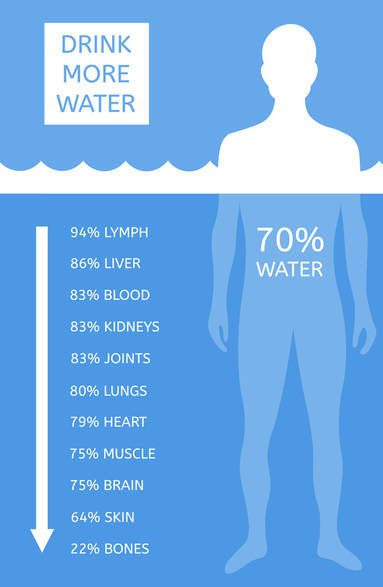
Only drinking pure water carries certain health risks.
In an interview with Professor Ma Quansheng, Vice President of the Chinese Nutrition Society and a professor at the School of Public Health at Peking University, he stated that there are over 40 nutrients essential for human health, primarily sourced from the various foods consumed daily, and minerals are supplied by drinking water.
The contribution rate of these factors to overall dietary intake ranges from 1% to 20%. For example, drinking water can provide up to 20% of the daily intake of calcium and magnesium, while for most other elements, drinking water contributes about 5% of the total.
Professor Ferman, a chemist at Free University of Berlin, Germany, and a member of the American Nutrition Society, stated:
“Pure water not only lacks mineral components, but it will also leach out original nutrients from the human body. Therefore, only drinking distilled water carries certain health risks. Because over-purified water lacks the nutrients that the human body needs to consume daily.”
Humans are fundamentally compatible with the hydrological environment in which they live. Water is the most active substance in the natural environment. The physical properties and chemical composition of natural water reflect a comprehensive array of factors, including climate, terrain, hydrology, geology, soil, and vegetation.
High-quality mineral water is the ideal choice for human consumption. Long-term consumption of certain types of purified water, referred to as “hollow water”, distilled water, and others can lead to the depletion of beneficial substances in the body, which is not advantageous for health.
Scientifically Hydrating Is Truly Beneficial for Health
According to dietary reference intake recommendations, individuals should drink 1.5 to 1.7 liters of water daily to meet physiological and health needs.
In fact, the food we eat daily contains a significant amount of water, such as 90% water in vegetables, 80% water in fruits, and 70% water in meat and fish. After accounting for the water in our food, we need to drink an additional 1500 ml of water each day to stay adequately hydrated.
Common Mistakes in Drinking Water
Drinking too much water can lead to a condition known as water intoxication, also referred to as water poisoning or hyponatremia. When the amount of water consumed is excessive, it dilutes electrolytes, especially sodium in the blood, causing sodium levels to drop below 135 mmol/l (hyponatremia). Sodium helps maintain the balance of fluids inside and outside of cells. When sodium levels decrease due to excessive water intake, fluids move from outside to inside the cells, causing them to swell. If this occurs in brain cells, it can lead to cerebral edema, disrupting brain function and affecting the central nervous system, which in severe cases can be fatal.
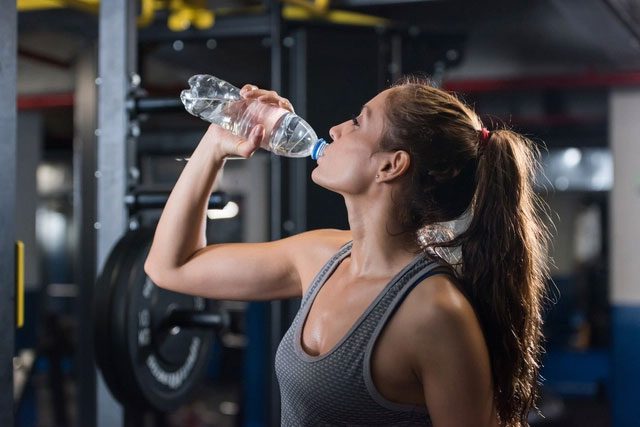
Drinking too much water can lead to water intoxication.
When Do Cases of Water Intoxication Typically Occur?
There have been numerous medical reports documenting cases of deaths due to excessive water consumption. Water intoxication cases often occur among individuals participating in sports or physical training, or those with mental health issues, when they improperly hydrate.
One report indicated that among 488 participants in the 2002 Boston Marathon, 13% experienced symptoms of hyponatremia, and 0.6% had severe hyponatremia, with sodium levels below 120 mmol/l.
This event also recorded a fatality when a participant improperly hydrated, causing sodium levels to drop below 130 mmol/l. This individual subsequently experienced cerebral edema and died.
Another medical report noted that 17 soldiers in the military suffered from hyponatremia after drinking too much water during training. Their blood sodium levels ranged from 115-130 mmol/l, while normal levels are between 135-145 mmol/l.


















































